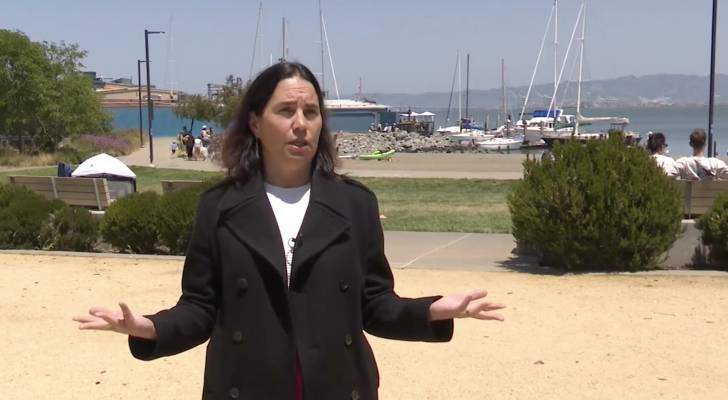
The San Francisco Parks Alliance (SFPA) — a nonprofit foundation established to “create, sustain and advocate for parks” — has abruptly shuttered amid a media and legal firestorm over alleged mismanagement involving at least $3.8 million in donations.
That leaves donors like Nicola Miner — whose Baker Street Foundation donated $3 million to the SFPA several years ago — “speechless.” She gave the SFPA that money to support construction of two neighborhood playgrounds.
Don’t miss
- I’m 49 years old and have nothing saved for retirement — what should I do? Don’t panic. Here are 6 of the easiest ways you can catch up (and fast)
- Robert Kiyosaki warns of a ‘Greater Depression’ coming to the US — with millions of Americans going poor. But he says these 2 ‘easy-money’ assets will bring in ‘great wealth’. How to get in now
- Gain potential quarterly income through this $1B private real estate fund — even if you’re not a millionaire. Here’s how to get started with as little as $10
“I wanted a park here, that was what our money was for,” Miner told CBS News.
But the parks never materialized. Instead, she learned that the SFPA — an arm’s-length fundraising partner of San Francisco’s Recreation and Parks Department — funneled nearly $2 million of her foundation’s donation to cover general operating expenses.
“The money was not for general operating expenses. And so I just feel a real sense of betrayal,” Minser said. “The fact that they took money away from families, I’m speechless.”
A prominent nonprofit falls from grace
The San Francisco Standard reports that top employees at the SFPA got bonuses despite a “massive deficit”, and the nonprofit spent more on “swanky galas” and fundraising events than it made.
“You would never, in a million years, give a bonus under these circumstances,” Joan Harrington, a nonprofit ethics expert at Santa Clara University, said.
Read more: Want an extra $1,300,000 when you retire? Dave Ramsey says this 7-step plan ‘works every single time’ to kill debt, get rich in America — and that ‘anyone’ can do it
In the wake of the allegations, San Francisco’s mayor froze the organization’s funding in May, and City Attorney David Chiu launched an integrity review into the nonprofit.
Subsequently, The San Francisco Standard reported that the SFPA was abruptly “winding down,” leaving donors and partners empty-handed.
Just days afterward, the San Francisco Government Audit and Oversight Committee subpoenaed the organization’s former CEOs and its board treasurer after they failed to show up at a committee hearing.
Doing your donation due diligence
Some donors may be left wondering how they could be let down by such a prominent and politically connected organization. It’s a reminder that a prominent name is no guarantee of continued success or appropriate management — and the prudent approach to committing funds is to perform thorough due diligence.
To help with this process, the Stanford Center on Philanthropy and Civil Society (Stanford PACS) has published “The Stanford PACS Guide to Effective Philanthropy,” with questions that donors should try to answer before making a commitment. For example:
- Does the nonprofit comply with tax regulations?
- Are its donations earmarked for a specific purpose (like a playground)?
- Are the donations restricted or unrestricted?
- How does the organization track and report restricted donations?
Restricted donations have conditions on how those funds are to be used, while unrestricted donations can be used for anything related to the nonprofit’s mission.
Stanford PACS also publishes the Philanthropist Resource Directory, which can be a helpful resource early in the due diligence journey.
Several third-party websites are also available to help with this process.
For example, GuideStar aggregates information about U.S. nonprofits registered as 501(c)(3) organizations and categorizes them based on the amount of information they self-report.
It also publishes IRS Form 990 tax returns, which are filed by “tax-exempt organizations, nonexempt charitable trusts and section 527 political organizations.”
GiveWell researches and recommends charities working in global health and poverty alleviation “that save or improve lives the most per dollar,” while Charity Navigator rates more than 225,000 nonprofits based on their “cost-effectiveness and overall health of a charity’s programs, including measures of stability, efficiency and sustainability.”
The Stanford PACS guide also suggests looking at which organizations have received grants from respected foundations such as the [Gates Foundation]https://www.gatesfoundation.org ) or Ford Foundation — both of which have searchable grants databases — and talking to people who’ve contributed to the organization or worked with it.
Donors can also consider a Donor Advised Fund (DAF), an account that allows donors to give to charity, receive an immediate tax deduction and recommend grants from the fund over time.
Donating a large amount of money to a charity is a big commitment — and even supposedly reputable organizations can run into trouble. So time spent on due diligence is time well spent.
What to read next
- JPMorgan sees gold soaring to $6,000/ounce — use this 1 simple IRA trick to lock in those potential shiny gains (before it’s too late)
- This is how American car dealers use the ‘4-square method’ to make big profits off you — and how you can ensure you pay a fair price for all your vehicle costs
- Here are 5 ‘must have’ items that Americans (almost) always overpay for — and very quickly regret. How many are hurting you?
- How much cash do you plan to keep on hand after you retire? Here are 3 of the biggest reasons you’ll need a substantial stash of savings in retirement
Like what you read? Join 200,000+ readers and get the best of Moneywise straight to your inbox every week. Subscribe for free.
This article provides information only and should not be construed as advice. It is provided without warranty of any kind.